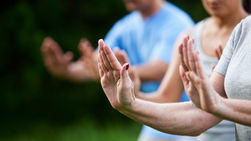"Having fun" An important ingredient
- Akiko Trush
- Feb 23, 2019
- 7 min read
Ms. Wong is a pianist from Hong Kong. She has been diagnosed of focal dystonia after a left elbow injury in 2015. Ms. Wong contacted me initially for advices over Skype but she has been visiting me to Tokyo for in person training sessions for few months.
Here one conversation we had that we thought it’ll be cool to share with our community. So here it goes.. !
***********************************
Me: How did you first find out about focal dystonia?
Wong: I found my left hand ring and pinky finger curling when I play in 2015 after an injury. I went to a orthopaedic doctor, who also happened to be a pianist and worked with other musicians and he diagnosed me of focal dystonia. I had brain scan, X-ray and all other sorts of exams, and the results came out all fine. After seeing a neurologist, he directed me to an occupational therapist. I went through 10 rounds of occupational therapy which consisted of going through series of exercises wearing a custom made splint. I think they helped to some extent but not enough to pin point towards my specific task which is to be able to play advanced repertoire on the keyboard. I went to many doctors and specialists in Hong Kong, but nothing seemed to work. So I tried many other things to “cure" myself.
Me: What did you try?
Wong: Qi-gong, meditation, alexander technique… I even injected glucose to try to spread my muscles in the hand. The injections were very expensive and did not work. I went to Chinese chiropractor… many times. Oh that was very scary.
Me: So how did you end up finding me?
Wong: I met another musician with focal dystonia, a bass player who was on a radio program in Hong Kong. He was talking about how he had focal dystonia and how he retrained himself. He suggested that I find my own way, do my own research and find somebody over the internet who can actually help me train myself. So I searched and I decided to contact you because you were a pianist who have recovered who is also guiding many other musicians to retrain by themselves.
Me: I see. I guess then we started with the online sessions. How was that work for you?
Wong: Honestly it was very difficult for me in the beginning. I don’t think I understood you quite well because of my limited understanding about the condition in general. I was clueless then. It was also difficult to see the positions and movements over the screen. A little difference of the angle make all the difference in understanding things that might be very important.
I would highly recommend anybody who is starting out to see you in person unless they have already spent significant time retraining and have already experienced results.
I have much clearer picture after visiting you in person. This is my fourth visit to Tokyo for your lessons. Now I have full understanding about my condition and how exactly to retrain until I fully recover.
Me: So how do you think the in person sessions compare to the online sessions?
Wong: Oh its so much easier. I like how you can constantly maneuver me and make me feel things that I should. Now I understand that’s its all about the many many tiny adjustments and fine tuning. The concept is very simple, but I don’t think I could have done this by myself even if you directed me over the screen, which you tried to do.
Me: What do you think you have you learned so far?
Wong: First of all, that posture and hand position matters a lot when it comes to sending the correct feedback, which is necessary to restore balance. Now I know that my body subconsciously wants to avoid dystonic sensations and often times my body starts compensating by choosing a unnatural posture and position that has less dystonic feeling over a natural position and movement with much more initial awkward dystonic sensations. But I have to find a way to be in a natural posture and to have natural contact points and then dissolve the awkward sensations which would then eliminate the tensions.
I also learned that my tension is present in places other than my main symptom areas. You had me review how I was using my right hand ( no symptom hand) as well.
I was so tense without knowing how tense I was.
Me: Yes, exactly. We tend to feel that we have finger problem and we tend to focus and over focus on our fingers, but if we look at it carefully or broaden our prospective a bit wider, it’s all about how we perceive the balance of the body.
Wong: Yes, I thought my problem was only my 4th and 5th finger of my left hand. But now, I’m not convinced it was.
Me: So what do you think your problem was?
Wong: Now I understand that I had a balance problem of using the whole hand. My whole hand just forgot how to keep it open and to keep just the right amount of balance overall to keep the 4th and 5th finger active, that’s all.
Me: Yes for example if you have curling 4th and 5th finger, just trying not to tense and easing those fingers doesn’t work. I think it’s important that we consciously shed attention to what the other fingers are up to when you try to use those fingers, how you are using the hand or not using parts of the hand, how you conceptualize your wrist, elbow, shoulder, upper body and so on.
Wong: Yes. And now that my hand have been restoring balance, I have a weird feeling off and on. It’s this weird but familiar feeling.. a feeling that I have all of a sudden recalled something very familiar from the past that I thought I had forgotten .. but now, I don’t know how to put this, but I recall how I used to play before. I have a strange feeling like ‘Whoa~! I know this feeling! This is how my hand functions! “ because after the onset of FD, I couldn’t recall how it felt to use my hands and fingers. Now that we reviewed logically how to operate my hands, and implement the balance, I have a gush of feeling of that feeling of strong functioning hand again!
Me: I think I understand what you mean. Memory is a very interesting thing. We might feel like we have forgotten how to do things when our bodies appear not to cooperate, but the memory is there waiting for it’s channel to open up.
I was helping another pianist retrain one day, and once we started moving in a way that she hadn’t in years, something struck and she was flooded with gush of memories of the time she used to play really well. She even recalled the scent of the building of her old practice room for a split moment. The sudden appearace of the lost memory was so overwhelming she got teary eyes. She said it was the weirdest feeling.
Sometimes, channels to memories spark for a split second and the movement and sensations are back into balance for that split moment and all of a sudden we have that strange sensation that you talked about.
Wong: Yes, I think that’s exactly what I experienced.
Me: Yes, the pathway to that feeling might not last especially in the earlier stages of retraining but we keep on trying. I personally see huge improvements in you, between the 4 or 5 lessons we have each time you come.
Most of my non-internet base local Tokyo focal dystonia students see me once a week until they are completely better or until they think they can manage the training by themselves. So they get better over time gradually and I see little bits of improvements over every week.
Now, you are an interesting case for me because you have been visiting me every 3~4 month, 4~5 days at a time, and we have 1~2 hour sessions a day during those 4~5 days. You improve quite a lot between those 3~4 months that I don’t see you, but you also progress a lot every day while you are here. I think it’s interesting because you don’t practice while you’re here… but you progress a lot everyday.
Wong: Yes! I’ve thought about this phenomenon as well. I think the key is that while I’m here in Tokyo, I’m having so much fun. I’m shopping, going to concerts, going to museums, going to hot spring, sight seeing town… I’m doing everything fun that Tokyo has to offer. Plus I relax really well. I only concentrate on having fun, learning new things from you and also catch up on sleep. I think the combination between being in a new exciting environment and accelerated learning all while relaxing is an ideal circumstance to shift things around.
Me: That’s super. That’s another great reminder that we learn things fast when we are having fun! Anything you’d like to share with other musician suffering with FD?
Wong: Focal dystonia is frustrating at first, but let’s try to think use this opportunity to transform this situation into something good. Try to use this opportunity to transform your life into something better than before.
Me: I totally see that attitude in you. You could have been feeling just miserable, upset, depressed and lost. You decided to take another path as I can see clearly.
Wong: Well I was at first. But you guided me through the turmoil as well. I think finding the right community is important too. Try to find somebody who have recovered already, there are many if you decide to reach out. For me personally, coming to Tokyo for retraining is actually very relaxing, fun and I learn so much every single time.
And this time, I have met your other focal dystonia retainer students here, and it was quite refreshing to see others who were in the same situation as I am. Thank you so much for arranging this get together meeting with them. I listened to everybody play (side note: on this particular day, there were 6 pianist with FD performing for each other in my studio) , and everyone seemed to be doing quite alright! I felt very hopeful as I listened to everyone else. Everybody played so beautifully. It was so nice.
Me: I agree. I think this tiny pressure they’ve had to play for each other was just right. They all felt safe, and also felt just enough pressure that they felt like they had to play through no matter what happened. When you’re alone, you tend to give up the moment something is not working.
Wong: Yes. well it was such a meaningful trip again. Thank you.
Me: Thank you for your insight!
































Comments